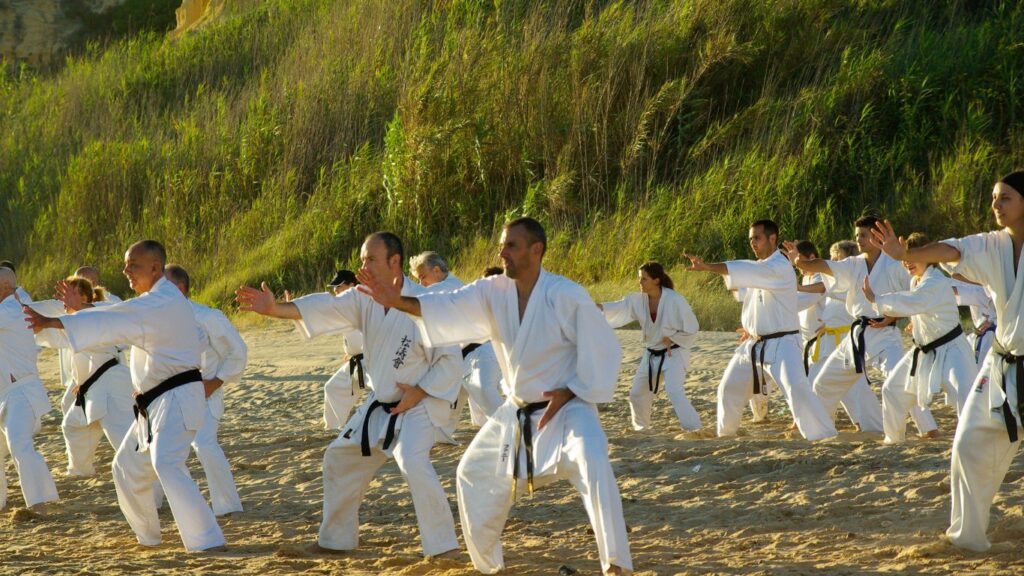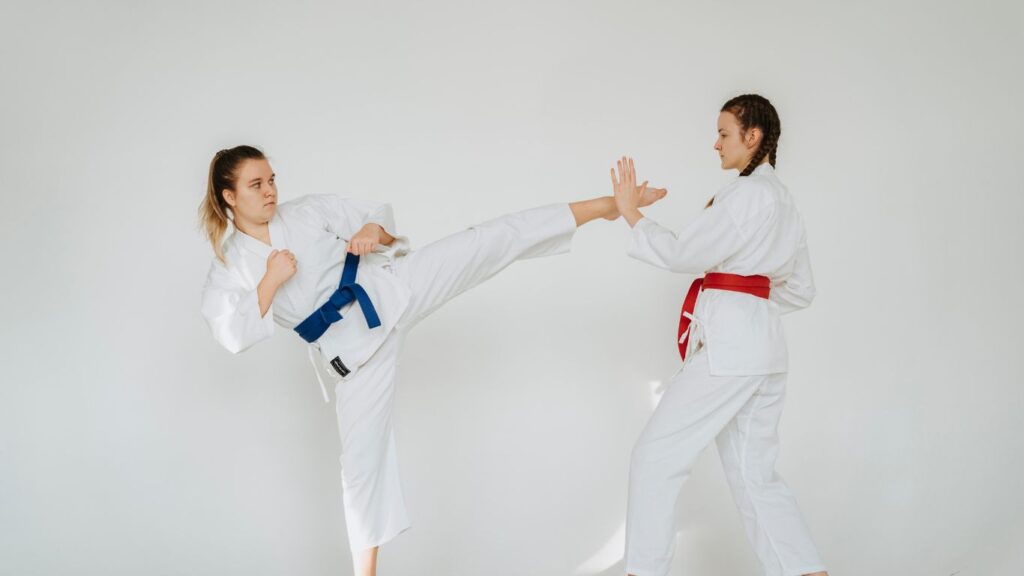Karate, a martial art that originated in the Ryukyu Kingdom, now part of Japan, has evolved from a method of self-defense into a holistic fitness discipline. In contemporary times, Karate has garnered immense popularity globally, transcending cultural and geographical boundaries. This martial art is not only a physical endeavor but also a practice that harmoniously integrates the body, mind, and spirit, contributing significantly to overall fitness and health development.
Beyond Self-Defense: Karate’s Role in Promoting a Healthy Lifestyle
Historical Context and Evolution of Karate
Karate, a martial art known for its striking techniques, originated in the Ryukyu Kingdom, now part of Japan, and was heavily influenced by Chinese Kung Fu. The term “Karate” originally meant “Chinese hand”, later evolving to “empty hand” in Japanese, reflecting its emphasis on weaponless self-defense. Over centuries, Karate absorbed elements from various martial arts, developing into distinct styles. These styles often varied in focus, from powerful linear movements to more fluid and circular techniques.
The 20th century saw Karate’s introduction to the Japanese mainland and subsequently to the rest of the world, where it gained immense popularity. This globalization led to the development of modern competitive Karate, alongside traditional forms. Karate, now an Olympic sport, is not only a physical discipline but also a path to spiritual and character development, embodying respect, discipline, and continuous improvement.
Physical Fitness and Karate
At its core, Karate offers a full-body workout. It involves rigorous physical training that enhances muscular strength, endurance, flexibility, and cardiovascular health. The repetitive nature of Karate drills and kata (a sequence of movements) promotes muscle memory and coordination.
- Strength and Muscle Development: Karate movements such as punches, kicks, and blocks involve multiple muscle groups. The isometric exercises in Karate also contribute to muscle strengthening, particularly in the core, arms, and legs.
- Cardiovascular Health: The high-intensity nature of Karate training, characterized by quick, explosive movements, significantly improves cardiovascular health. This aspect is critical in reducing the risk of heart diseases and improving overall heart function.
- Flexibility: Karate incorporates various stretching exercises that enhance flexibility. Improved flexibility is crucial for injury prevention and can lead to better posture and reduced muscle soreness.

Mental Health and Cognitive Benefits
Karate is not just a physical journey; it’s a mental one as well. The practice of Karate requires concentration, discipline, and mental resilience.
- Stress Reduction: The meditative aspect of Karate, especially during Kata practice, helps in reducing stress and anxiety. The focus required in Karate can also be a form of mindfulness meditation.
- Cognitive Function: Learning and remembering the sequences in Kata, understanding the timing and application of techniques, enhances cognitive functions like memory, concentration, and decision-making skills.
- Self-Discipline and Confidence: Regular practice instills a sense of discipline and respect, traits that extend beyond the dojo (training hall). Karate also builds confidence, as practitioners overcome challenges and achieve new ranks.
Social and Emotional Development
Karate training is often conducted in groups, which fosters a sense of community and belonging. Practitioners learn respect, not only for their teachers and peers but also for themselves. This social interaction plays a vital role in emotional health.
- Teamwork and Leadership: While Karate is an individual practice, training often involves group activities that teach teamwork. Senior students often lead groups, fostering leadership skills.
- Resilience and Coping Skills: Karate teaches one to face challenges and setbacks, a valuable life skill. The resilience built in the dojo can help in coping with life’s challenges.
Karate for All Ages
Karate is a versatile martial art that offers unique benefits across all age groups:
- Children (Ages 5-12):
- Physical Coordination: Enhances balance, agility, and hand-eye coordination.
- Discipline and Focus: Instills discipline, helping improve attention span and focus in school and other activities.
- Confidence Building: Encourages confidence through the mastery of new skills and belt progression.
- Social Skills: Provides opportunities for interaction with peers, fostering teamwork and communication skills.
- Adolescents (Ages 13-19):
- Stress Management: Offers an outlet for stress and anxiety, common in teenage years.
- Physical Fitness: Keeps teenagers physically active, countering sedentary lifestyle habits.
- Self-Defense Skills: Teaches practical self-defense techniques, promoting a sense of security.
- Positive Peer Environment: Provides a constructive community away from negative influences.
- Adults (Ages 20-60):
- Health and Fitness: Aids in maintaining overall health, muscle tone, and cardiovascular fitness.
- Mental Well-being: Acts as a stress reliever and enhances mental clarity.
- Lifelong Learning: Encourages continuous learning and self-improvement.
- Community and Networking: Offers opportunities to connect with a diverse group of individuals.
- Seniors (Ages 60 and above):
- Balance and Coordination: Improves balance and coordination, reducing the risk of falls.
- Joint Mobility and Flexibility: Enhances joint mobility and flexibility, crucial in older age.
- Cognitive Function: Keeps the mind active, potentially delaying or mitigating cognitive decline.
- Social Engagement: Provides a sense of community and combats loneliness.

Karate in Modern Fitness Regimes
In modern fitness regimes, Karate has carved a niche for itself as a comprehensive workout that complements various fitness approaches. It is increasingly recognized for its versatility and holistic health benefits, making it a popular choice in contemporary fitness plans. Karate integrates seamlessly with cardio workouts, enhancing endurance and heart health. Its techniques and kata (forms) improve strength, flexibility, and coordination, offering a balanced alternative to traditional gym routines.
Additionally, Karate’s focus on mental discipline and mindfulness brings a unique element to fitness, addressing mental well-being alongside physical health. This martial art also offers a dynamic and engaging way to stay fit, breaking the monotony of conventional exercises. With its adaptability to various fitness levels and goals, Karate appeals to a wide demographic, from fitness enthusiasts seeking a new challenge to individuals looking for a more holistic approach to health and wellness.
Health Benefits Beyond the Physical Fitness
Karate’s health benefits transcend physical fitness, significantly impacting mental and emotional well-being. This martial art instills a sense of discipline and focus, essential for mental clarity and stress reduction. The practice of Karate demands concentration and mindfulness, which translates into improved cognitive functions like memory and decision-making.
Moreover, the meditative aspects of Karate, particularly during Kata practice, provide a mental respite, aiding in stress management and emotional balance. Regular engagement in Karate enhances self-esteem and confidence, as practitioners overcome challenges and achieve new skills. The social aspects of training in a dojo foster a sense of community and belonging, crucial for emotional health.
Karate also promotes resilience, teaching practitioners to approach life’s challenges with a calm and focused mindset. By integrating physical activity with mental and emotional development, Karate offers a holistic approach to health, ensuring practitioners gain benefits that extend far beyond physical fitness.

Conclusion
In conclusion, Karate transcends its traditional role as a martial art focused on self-defense, emerging as a powerful tool in promoting a holistic, healthy lifestyle. It uniquely blends physical fitness with mental fortitude, emotional balance, and social well-being. Practitioners of Karate enjoy a range of benefits from improved physical health and flexibility to enhanced mental clarity and stress reduction. Furthermore, the discipline and values instilled through Karate extend into daily life, fostering confidence, resilience, and a sense of community. As a practice accessible to all ages and skill levels, Karate stands as a testament to the enduring power of integrating mind, body, and spirit in the pursuit of overall wellness.
Also read: How to Stay Motivated for Morning Workouts: Tips and Tricks
